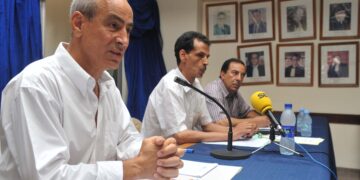Mohammed bin Abdulmalek al-Sheikh, head of the Saudi Authority for Intellectual Property, oversaw the torture of at least three detainees between September 2017 and October 2018 and the unlawful expropriation of assets from prominent Saudi business executives and former government officials detained at the Ritz-Carlton Hotel in Riyadh in November 2017.
On April 4, 2022, DAWN detailed the detention, torture, and forced confiscation of assets of one of his victims at the Ritz-Carlton Hotel, Salem Almuzaini, from September 27, 2017, until January 18, 2018. Upon his release, Saudi officials banned Almuzaini from travel and forced him to wear an ankle monitor before detaining him again on August 24, 2020. He currently remains in prison.
According to an affidavit filed in the Ontario Superior Court of Justice by Almuzaini in Canada, Mohammed bin Abdulmalek al-Sheikh was physically present at his torture sessions between September 2017 and January 2018. Almuzaini heard al-Sheikh order his assistant, Hendi Alsuhaimi, to ensure that Almuzaini transferred his money and assets, including ownership of Sky Prime Aviation, to the Public Investment Fund (PIF), Saudi Arabia's sovereign wealth fund. According to Almuzaini, the transfer took place after multiple Saudi officers from the Royal Court and State Security Presidency, including Badr Lafi Alotaibi, Saud al-Qahtani, Maher Abdulaziz Mutreb, Meshal Albostani, Mohammed Saad Alzahrani, Saif al-Qahtani, Abdulaziz Alhawsawi, Mustafa Mohammed al-Madani, and Fahad Shabib Albalawi, allegedly tortured and physically abused him. Three of Almuzaini's family members whom DAWN interviewed on multiple occasions between January and November 2021 confirmed Almuzaini's account, stating they heard these details from him and acquired notes he wrote about the incidents before his most recent arrest.
In his affidavit, and as confirmed by statements from his family members to DAWN, Almuzaini describes the physical and psychological torture to which these Saudi officers interrogated him and subjected him on multiple occasions at al-Haer Prison, in a prison in Jeddah and at the Ritz-Carlton Hotel in Riyadh between September 2017 and January 2018, including beatings, whippings, forced stress positions, electrocution, and food deprivation. In the affidavit, Almuzaini said al-Sheikh was present during some of these interrogation and torture sessions. Almuzaini said that the officers subjected him to beatings with iron bars and cruel practices, such as a prison guard whipping his genitals each time he walked to the washroom. Further cruel, inhuman, and degrading practices included forcing Almuzaini to crawl on the floor and bark like a dog. Saudi officers tortured Almuzaini when he was initially detained in Jeddah, after being transferred to the Ritz-Carlton Hotel in Riyadh, and then again after they moved him to al-Haer Prison in Riyadh.
Months after his initial release on January 18, 2018, Almuzaini's body still showed the marks of torture, as documented in the pictures attached to his affidavit. According to family members who spoke to DAWN in November 2021, after his initial release, Almuzaini required plastic surgery to fill an indentation in his forehead caused by a strike from an interrogator. During this time, Almuzaini's toenails continued to fall off due to repeated blows to his legs and feet. According to the same source, Almuzaini suffers from anxiety and trauma as a result of his detention and torture.
While confiscating Almuzaini's assets, al-Sheikh transferred two private planes confiscated from Sky Prime to the Public Investment Fund and later used to fly the hit squad that killed and dismembered Saudi journalist Jamal Khashoggi at the Saudi Consulate in Istanbul, Turkey, on October 2, 2018. Almuzaini identified ten officers and individuals involved in the murder of Khashoggi as the same individuals who took part in his own torture and physical abuse.
Two other individuals, whose names and further identifying details we keep confidential to protect their safety, told DAWN that state security forces detained them in 2018 and tortured them for their peaceful activism. They said that they recognized al-Sheikh from their own torture sessions. Both said they saw a person whose appearance was similar to al-Sheikh's despite the face mask that covered most of his face and noticed that their interrogators and others in the room were deferential to him, reflecting his formal position and status in the Saudi government. They also separately told DAWN that the voice of the masked person, whom they suspect was al-Sheikh matched al-Sheikh's tone. When one of them asked the masked person about his name, he refused to answer.
"Al-Sheikh operated like a gang master under Saudi Crown Prince Mohamed bin Salman to torture and extort Saudi businessmen into handing over money using the 'anti-corruption' pretext," said Jon Hoffman, Research Director at DAWN. " The United States should impose both Khashoggi Ban and Magnitsky Sanctions on al-Sheikh to hold him accountable for his crimes."
On November 4, 2017, Crown Prince Mohamed bin Salman (MBS) embarked on an "anti-corruption" purge targeting more than 200 Saudi tycoons, including powerful princes such as the once-powerful Prince Turki bin Abdullah, a son of the late King Abdullah and former governor of Riyadh. When the purge of wealthy individuals accused of corruption concluded in 2019, Saudi officials, acting under the supervision of the Anti-Corruption Committee headed by MBS, arrested, physically abused or otherwise demanded money from a total of 381 individuals, including at least 11 princes. Saudi authorities released them in exchange for "financial settlements." The Royal Court said it recovered between $100 and $107 billion in the purge. The authorities did not charge these individuals with crimes nor file suit in civil court for financial remedies. Mohammed al-Sheikh was critical to these efforts, overseeing the process of forcefully transferring assets of those targeted to the Saudi government.
Mohammed al-Sheikh is a close advisor to Saudi Crown Prince Mohamed bin Salman. He was appointed as chairman of the Saudi Authority for Intellectual Property on November 13, 2020. He is also Minister of State, cabinet member, and a member of the Council for Economic Affairs and Development. Previously, he was appointed head of the Saudi Sports Authority by royal decree in April 2017 and headed the Saudi government's Capital Market Authority from 2013 until 2017, also through appointment by royal decree.
Al-Sheikh worked for the World Bank from 1998 until 2001, before entering private practice for a law firm in New York from 2001 until 2003. Returning to Saudi Arabia, he worked as a legal consultant between 2003 and 2012, before the Saudi government named him as a representative to the World Bank in Washington. Al-Sheikh has worked for several boards, including Aramco and the World Bank Group.
Al-Sheikh was born in Taif, Saudi Arabia on July 20, 1969. He received a bachelor's degree in Judicial Studies from Umm Al-Qura University in Saudi Arabia, and an LLM from Harvard Law School.
DAWN has submitted a detailed investigation about al-Sheikh for Khashoggi Ban sanctions to the U.S. Department of State to be sanctioned under the Khashoggi Ban. DAWN also urges the Treasury Department to sanction al-Sheikh under the Magnitsky Act as well.
DAWN contacted al-Sheikh via the Saudi authorities on February 7, 2023 to request a response, but no response was received by the time of publication.
***
Tweet at the Saudi Authority for Intellectual Property of which al-Sheikh is the chairman of the board here and the Saudi Embassy in Washington DC here. Tell them to stop employing abusive individuals like al-Sheikh.
About DAWN's culprit gallery:
Tyrants need enablers who will implement their oppressive practices, even if it means abusing their fellow citizens. These agents often mask their complicity in the guise of professionals exercising their duties in offices, courtrooms, police stations, and interrogation rooms. DAWN seeks to disclose the identity of the state agents who enable repression and to make them recognizable at home and abroad. These individuals, whom DAWN calls "culprits," bear administrative, civil, moral, legal, and/or political responsibility for human rights and international humanitarian law violations.







































